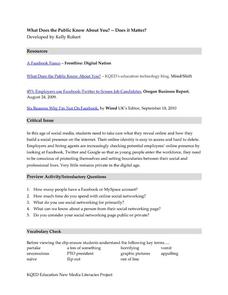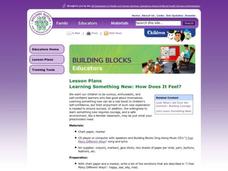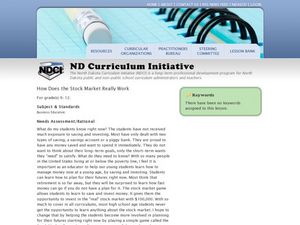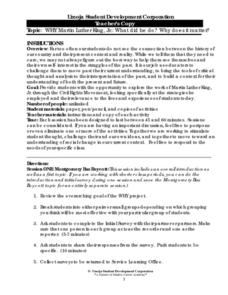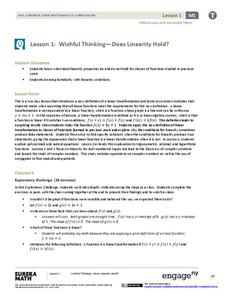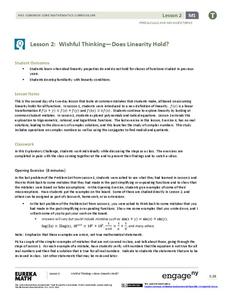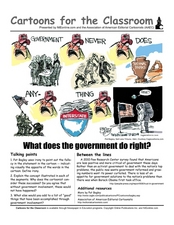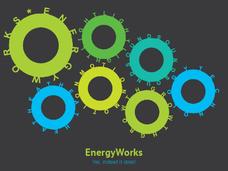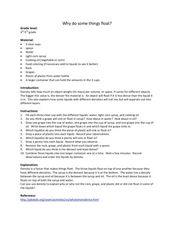Curated OER
Do You Have a Blog?
Ask learners about their personal writing habits, such as whether they keep a journal or a blog, or if they'd ever want to. Though this is not a fully developed lesson, you can use this article and question to provoke discussion and...
Curated OER
What Does the Public Know About You? --Does it Matter?
Young people today have to be very careful with how they present themselves online. Show them the possible impact of their online activity and what employers might see when performing a basic search. The lesson provides a video clip...
US Department of Health and Human Services
Learning Something New: How Does It Feel?
Use song and dance to help your youngsters identify their feelings and embrace learning. Starting with a brainstorming activity, class members talk about learning new things and how this made them feel. After listing to the song, and...
EngageNY
Researching about the Red Cross, Continued: Who Is the Red Cross and What Does This Multinational Organization Do?
Code red! Learners read an informational article about the Red Cross, discussing the gist of the text in small groups. On a three-column note catcher, pupils take notes to show how the Red Cross functions as a multinational aid...
Curated OER
How Does the Stock Market Really Work?
Investigate the stock market as it relates to the business world. Young scholars investigate ways to invest their money for the future. They make a presentation and discuss their findings with the class.
Intel
What Does This Graph Tell You?
What can math say about natural phenomena? The fifth STEM lesson in this project-based learning series asks collaborative groups to choose a phenomenon of interest and design an experiment to simulate the phenomenon. After collecting...
Curated OER
How does Physical activity Help You?
Examine factors that influence your choice about physical activity. In this physical activity lesson plan, students recognize how physical activity and good health go together. Students participate in a survey about...
Umoja Student Development Corporation
Martin Luther King, Jr.: What Did He Do? Why Does It Matter?
Young historians examine the work of Martin Luther King Jr. by reading and answering questions about the Montgomery Bus Boycott, the Albany Movement, the Birmingham and Chicago campaigns, and the Memphis Sanitation Worker's Strike....
EngageNY
Wishful Thinking—Does Linearity Hold? (Part 1)
Not all linear functions are linear transformations — show your class the difference. The first lesson in a unit on linear transformations and complex numbers that spans 32 segments introduces the concept of linear transformations and...
EngageNY
Wishful Thinking—Does Linearity Hold? (Part 2)
Trying to find a linear transformation is like finding a needle in a haystack. The second lesson in the series of 32 continues to explore the concept of linearity started in the first lesson. The class explores trigonometric, rational,...
Curated OER
Look Out My Window. What Do You See?
Students explore William D. Huff's experience during Civil War as portrayed in his drawings, express empathy and demonstrate historical knowledge through creating their own artwork, and craft drawings and captions from perspectives of...
Alabama Learning Exchange
WATER You Doing to Help?
Auntie Litter is here to educate young scholars about water pollution and environmental stewardship! Although the 15-minute video clip is cheesy, it's an engaging look at the water cycle and conservation. Learners start by illustrating...
Curated OER
Oxidation: Does Iron Burn?
Searching for a fairly easy demonstration of how oxidation triggers rust formation? The demonstration allows high school chemists to witness the rusting of metals, as large and small objects are held into a flame while triggering the...
Curated OER
Beginning Short Stories - "What Do We Have to Eat?"
After reading two short stories, learners identify vocabulary associated with food and eating. This activity with 5 questions could be used as a reading comprehension and vocabulary practice for younger students or an ESL worksheet for...
PBS
What We Do Adds Up
With so many tons of trash going into landfills each year, your environmentalists can calculate how much the average person is tossing away. This activity has a series of questions not only requiring math, but a conscious thought of how...
Curated OER
What Do Koalas Need to Survive?
First graders take a field trip and examine the Koala and his habitat. In this Koala lesson, 1st graders read Possum Magic and discuss the foods of Australia. Students view the habitat of a Koala and record what it eats, its...
Curated OER
Does the Sidewalk Drink Puddles?
Students participate in an experiment about evaporation. In this water cycle lesson, students use water, thermometers, and measuring tools to make a puddle and measure the size four times throughout the day. Students discuss their data...
Curated OER
What Does the Government Do Right?
Challenge your class to reevaluate preconceived notions about government with this political cartoon analysis. An image presents a clear example of irony, in which a disgruntled American complains about his government, yet fails to see...
National Energy Education Development Project
Energy Works: Yes, Indeed it Does!
Moving from its definition to how it moves and its different types, scholars see different examples and then move into its application and use in everyday lives, in an energy-based presentation.
Colorado State University
Why Do Raindrops Sometimes Land Gently and Sometimes with a Splat?
A mouse can fall from large heights without injury! Air resistance is a large influence on small falling objects. In an exploratory lesson, young scholars build a raindrop bottle to compare the falling rate of different-sized objects.
Centers for Disease Control and Prevention
Statewide Smokefree Laws
Does your state allow smoking in public workplaces? What about in bars or restaurants? Take a look at an informative map of the United States to see what states do not allow smoking indoors, what states do not have indoor air laws on the...
Curated OER
Why Do Some Things Float?
Students recognize that density determines whether objects sink or float. In this sink or float lesson, students experiment with plastic in three liquids. students drop their objects into the liquids and observe and record their...
Curated OER
Does It Move On It's Own?
Young scientists look at drawings of six animals, then match up a word that describes how they move. The words are: hop, crawl, swim, fly, run, and jump. They also answer two additional questions about the animals and how they move. A...
Classroom Law Project
What does the Constitution say about voting? Constitutional Amendments and the Electoral College
As part of a study of voting rights in the US, class members examine Constitutional amendments connected with voting and the role of the Electoral College in the election process.
Other popular searches
- Picture Does Not Belong
- Al Capone Does My Shirts
- Do and Does
- Does
- Which Word Does Not Belong
- Does Not Belong
- How Does Light Travel
- Sentence Does Not Belong
- Which Does Not Belong
- Anansi Does the Impossible
- Does Salt Evaporate
- Where Does Food Come From



